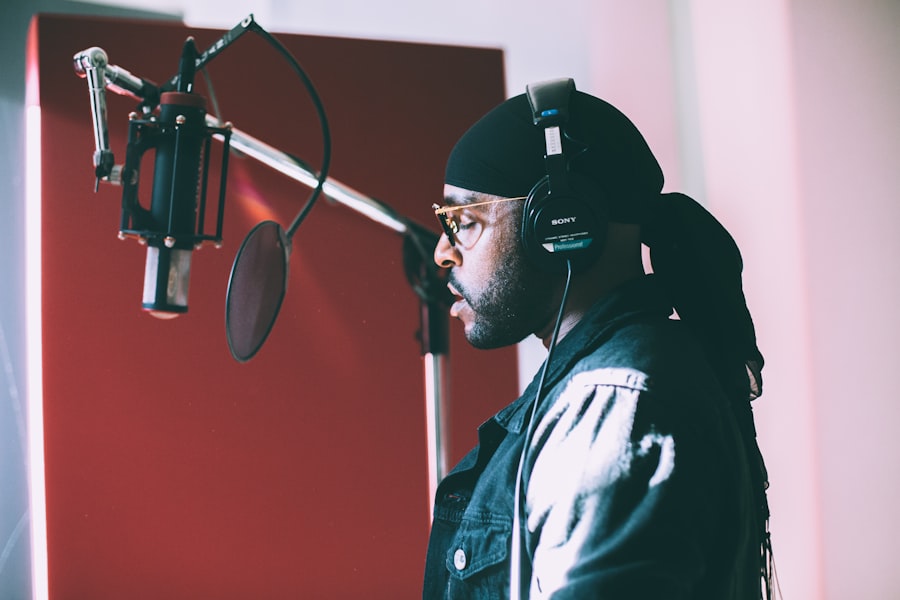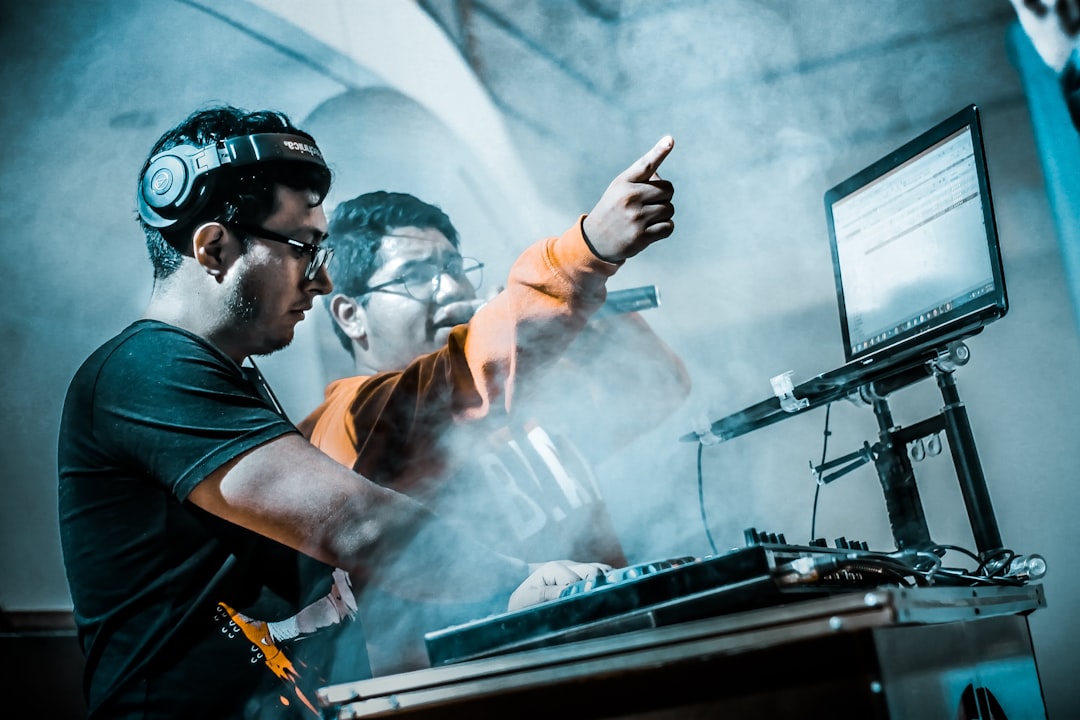The music industry has come a long way since its inception. From vinyl records to cassette tapes, CDs to digital downloads, and now streaming services, the way we consume music has drastically changed over the years. Alongside these changes, technology has played a significant role in shaping the music industry.
In the early days, music was primarily distributed through physical formats such as vinyl records and cassette tapes. This meant that artists had to rely on record labels to produce and distribute their music. However, with the advent of digital technology, the music industry underwent a major transformation. The rise of the internet and digital platforms allowed artists to distribute their music directly to consumers, bypassing traditional record labels.
Key Takeaways
- The music industry has evolved over time, with the emergence of new technologies and platforms.
- Music influencers have become a powerful force in the digital age, with the ability to reach large audiences and promote music.
- TikTok influencer database can be a valuable tool for music promotion, allowing brands to connect with relevant influencers.
- TikTok can be leveraged for effective music marketing strategies, such as creating viral challenges and using popular songs in videos.
- Social media and influencer marketing can have a significant impact on music promotion, providing new opportunities for artists and brands.
The Emergence of Music Influencers
With the rise of social media and digital platforms, a new breed of music promoters has emerged – music influencers. Music influencers are individuals who have built a large following on social media platforms such as Instagram, YouTube, and TikTok, and have a significant impact on their audience’s music consumption habits.
Unlike traditional music promoters who rely on radio play or record label endorsements, music influencers have a direct connection with their audience. They are seen as more relatable and authentic, which makes their recommendations more influential. Music influencers often share their favorite songs or artists with their followers, creating a ripple effect as their followers discover and share the music with their own networks.
The Power of Music Influencers in the Digital Age
Music influencers have a unique ability to reach and engage with a large audience. With millions of followers on platforms like Instagram and YouTube, they have the power to introduce new artists and songs to a massive audience in an instant. This level of reach is unprecedented in the history of the music industry.
Moreover, music influencers have a strong influence on their audience’s music consumption habits. When an influencer recommends a song or artist, their followers are more likely to listen to and engage with that music. This can lead to increased streams, downloads, and even ticket sales for the recommended artist.
The Role of TikTok Influencer Database in Music Promotion
| Metrics | Description |
|---|---|
| Number of TikTok Influencers | The total number of influencers in the TikTok database who can promote music. |
| Engagement Rate | The percentage of followers who engage with the influencer’s content, such as likes, comments, and shares. |
| Reach | The number of unique users who see the influencer’s content. |
| Genre | The type of music that the influencer promotes, such as pop, hip-hop, or country. |
| Cost per Post | The amount of money required to have an influencer promote a song or album on their TikTok account. |
| Conversion Rate | The percentage of users who listen to the promoted music after seeing it on the influencer’s TikTok account. |
TikTok, a popular social media platform known for its short-form videos, has become a powerful tool for music promotion. With its massive user base and viral nature, TikTok has the potential to catapult songs and artists to stardom overnight. To leverage the power of TikTok, many music marketers turn to TikTok influencer databases.
A TikTok Influencer Database is a collection of profiles and contact information of popular TikTok influencers. These databases help music marketers find the right influencers who align with their brand and target audience. By partnering with the right influencers, music marketers can tap into their large following and leverage their influence to promote their music.
Leveraging TikTok for Music Marketing Strategies
TikTok has quickly become a favorite platform among music lovers. Its short-form videos and catchy challenges make it the perfect platform for discovering new music and sharing it with others. To create effective music marketing campaigns on TikTok, music marketers need to understand the platform’s unique features and user behavior.
One effective strategy is to create a challenge or dance routine around a specific song. By encouraging users to participate in the challenge and create their own videos using the song, music marketers can generate buzz and virality around the song. This can lead to increased streams and downloads as more users discover and engage with the music.
The Impact of Social Media on Music Promotion

Social media platforms have revolutionized the way music is promoted. Artists no longer have to rely solely on record labels or radio play to gain exposure. They can now connect directly with their fans through platforms like Instagram, Twitter, and Facebook.
Social media allows artists to share behind-the-scenes content, interact with fans, and promote their music in a more personal and authentic way. It also provides a platform for fans to discover new music and share their favorite songs with their own networks. This word-of-mouth promotion can have a significant impact on an artist’s success.
The Benefits of Using Influencer Marketing for Music Promotion
Influencer marketing has become a popular strategy for music promotion. It offers several advantages over traditional marketing methods. Firstly, influencer marketing allows artists to reach a wider audience. By partnering with influencers who have a large following, artists can expose their music to a massive audience that they may not have been able to reach otherwise.
Secondly, influencer marketing is more authentic and relatable. Influencers are seen as trusted sources of information and recommendations. When an influencer promotes a song or artist, their followers are more likely to listen to and engage with that music. This level of trust and authenticity can lead to increased streams, downloads, and fan engagement.
How to Find the Right Music Influencers for Your Brand
Finding the right music influencers for your brand is crucial for the success of your music promotion campaigns. Here are some tips for finding the right influencers:
1. Define your target audience: Before you start searching for influencers, it’s important to define your target audience. This will help you narrow down your search and find influencers who have a similar audience demographic.
2. Research influencers in your genre: Look for influencers who specialize in your genre of music. They will have a better understanding of your target audience and be more likely to resonate with them.
3. Evaluate engagement metrics: When evaluating potential influencers, look at their engagement metrics such as likes, comments, and shares. High engagement indicates that the influencer has an active and engaged audience.
4. Consider the influencer’s brand alignment: Make sure the influencer’s brand aligns with yours. Look at their previous collaborations and content to ensure that their values and aesthetic align with your brand.
The Future of Music Promotion: The Rise of TikTok Music Promotion
TikTok has quickly become a game-changer in the music industry. Its viral nature and massive user base have the potential to launch songs and artists to stardom overnight. As more artists and music marketers recognize the power of TikTok, we can expect to see an increase in TikTok music promotion strategies.
TikTok’s algorithm-driven content discovery system ensures that even lesser-known artists have a chance to go viral. This democratization of music promotion allows for a more diverse range of artists to gain exposure and success. With its short-form videos and catchy challenges, TikTok provides a unique platform for artists to connect with their fans and promote their music in a fun and engaging way.
The Endless Possibilities of Technology in the Music Industry
The music industry has undergone significant changes over the years, thanks to advancements in technology. From vinyl records to streaming services, technology has revolutionized the way we consume and promote music. The rise of social media platforms like TikTok has further transformed the music industry, giving artists and music marketers new tools and strategies to reach a wider audience.
As technology continues to evolve, we can expect even more innovations in the music industry. Virtual reality concerts, AI-generated music, and personalized music recommendations are just a few examples of what the future holds. The possibilities are endless, and it’s an exciting time for both artists and music lovers alike.
If you’re interested in exploring how technology has revolutionized the music industry, you should definitely check out this fascinating article on music-influencer.com. It delves into the various ways in which technology has transformed the way we create, consume, and distribute music. From the rise of digital streaming platforms to the impact of social media on artist promotion, this article provides valuable insights into the ever-evolving landscape of the music industry. Additionally, if you’re new to the world of music technology, you might want to start with their introductory piece titled “Hello World!” which offers a great overview of the topic. Happy reading!
FAQs
What is the impact of technology on the music industry?
Technology has had a significant impact on the music industry, from the way music is produced, distributed, and consumed. It has revolutionized the way artists create and share their music with the world.
How has technology changed the way music is produced?
Technology has made it easier and more affordable for artists to produce music. With the availability of digital audio workstations, artists can record, mix, and master their music from the comfort of their homes. Additionally, technology has made it possible to create new sounds and experiment with different genres.
How has technology changed the way music is distributed?
Technology has made it easier for artists to distribute their music to a global audience. With the rise of digital music platforms like Spotify, Apple Music, and Tidal, artists can reach millions of listeners without the need for a record label. Additionally, social media platforms like YouTube and Instagram have made it easier for artists to promote their music and connect with fans.
How has technology changed the way music is consumed?
Technology has changed the way people consume music. With the rise of streaming services, people can access millions of songs on their smartphones, tablets, and computers. Additionally, technology has made it possible for fans to interact with their favorite artists through social media and live streaming platforms.
What are some of the challenges facing the music industry due to technology?
One of the biggest challenges facing the music industry is piracy. With the availability of free music downloads, artists and record labels are losing revenue. Additionally, the rise of streaming services has led to concerns about fair compensation for artists and songwriters.

